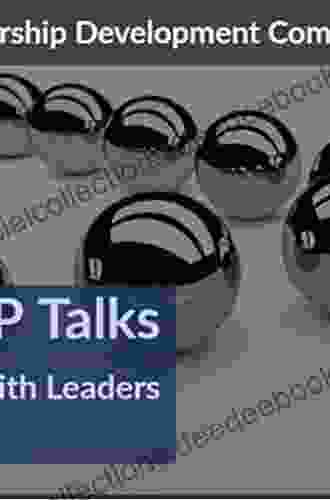Unveiling Discursive Leadership: A Journey into Conversation with Leadership Psychology

Discursive leadership is a relatively new approach to understanding leadership that focuses on the way leaders use language to create meaning and shape their followers' perceptions of the world. This approach is based on the idea that language is not simply a neutral tool for communication, but rather a powerful force that can be used to influence and persuade others.
In this article, we will explore the concept of discursive leadership in more detail and discuss its implications for leadership psychology. We will begin by defining discursive leadership and describing its key features. Next, we will discuss the different ways that leaders can use language to influence their followers. Finally, we will explore the challenges and opportunities that discursive leadership presents for leadership psychology.
5 out of 5
| Language | : | English |
| File size | : | 2341 KB |
| Text-to-Speech | : | Enabled |
| Screen Reader | : | Supported |
| Enhanced typesetting | : | Enabled |
| Print length | : | 255 pages |
Defining Discursive Leadership
Discursive leadership is a style of leadership that focuses on the use of language to create meaning and shape followers' perceptions of the world. Discursive leaders are skilled at using words to inspire, motivate, and persuade others. They can use language to create a shared vision and to build a sense of community among their followers.
Discursive leadership is based on the idea that language is not simply a neutral tool for communication, but rather a powerful force that can be used to influence and persuade others. Discursive leaders understand the power of language and use it strategically to achieve their goals.
Key Features of Discursive Leadership
There are a number of key features that distinguish discursive leadership from other approaches to leadership. These features include:
- Focus on language: Discursive leadership is primarily concerned with the use of language. Discursive leaders are skilled at using words to create meaning and shape followers' perceptions of the world.
- Emphasis on communication: Discursive leadership is based on the idea that communication is essential for effective leadership. Discursive leaders communicate frequently and effectively with their followers. They use language to inspire, motivate, and persuade others.
- Creation of shared meaning: Discursive leaders are able to create shared meaning among their followers. They use language to create a shared vision and to build a sense of community among their followers.
- Use of narrative: Discursive leaders often use narrative to communicate with their followers. Narrative is a powerful tool for creating meaning and shaping perceptions. Discursive leaders use narrative to tell stories that inspire, motivate, and persuade others.
Ways That Leaders Can Use Language to Influence Followers
There are a number of different ways that leaders can use language to influence their followers. These include:
- Framing: Framing is a technique that leaders use to shape the way that their followers think about an issue. Leaders can frame an issue in a way that makes it more or less appealing to their followers.
- Priming: Priming is a technique that leaders use to activate certain concepts or ideas in the minds of their followers. Leaders can prime their followers by using certain words or phrases.
- Emotional appeals: Emotional appeals are a technique that leaders use to evoke emotions in their followers. Leaders can use emotional appeals to inspire, motivate, or persuade their followers.
- Persuasion: Persuasion is a technique that leaders use to change the minds of their followers. Leaders can use persuasion to convince their followers to adopt a new belief or behavior.
Challenges and Opportunities for Discursive Leadership
Discursive leadership presents a number of challenges and opportunities for leadership psychology. Challenges include:
- The challenge of authenticity: Discursive leadership can be challenging for leaders who are not authentic. Discursive leaders need to be able to speak from the heart and to connect with their followers on a personal level.
- The challenge of manipulation: Discursive leadership can be used for manipulative purposes. Leaders who are not ethical may use language to deceive or exploit their followers.
Despite these challenges, discursive leadership also presents a number of opportunities for leadership psychology. Opportunities include:
- The opportunity for greater understanding: Discursive leadership can help us to better understand the role that language plays in leadership. This understanding can help us to develop more effective leadership development programs.
- The opportunity for more effective leadership: Discursive leadership can help leaders to become more effective communicators. This skill can help leaders to inspire, motivate, and persuade their followers.
- The opportunity for more ethical leadership: Discursive leadership can help leaders to become more ethical leaders. This understanding can help leaders to use language in a responsible and ethical way.
Discursive leadership is a new and exciting approach to understanding leadership. This approach focuses on the way that leaders use language to create meaning and shape their followers' perceptions of the world. Discursive leadership presents a number of challenges and opportunities for leadership psychology. However, this approach also has the potential to help us to develop more effective leadership development programs and to help leaders to become more effective communicators and more ethical leaders.
References
Boal, K. (2002). Acting as a way of knowing: Reflections on theater, teaching, and social change. Portsmouth, NH: Heinemann.
Fairhurst, G. T., & Sarr, R. A. (1996). The art of framing: Managing the language of leadership. San Francisco, CA: Jossey-Bass.
Mumby, D. K. (2005). Discourse analysis for organizational studies: A research reader. London: SAGE.
Van Dijk, T. A. (1998). Discourse as social interaction. London: SAGE.
5 out of 5
| Language | : | English |
| File size | : | 2341 KB |
| Text-to-Speech | : | Enabled |
| Screen Reader | : | Supported |
| Enhanced typesetting | : | Enabled |
| Print length | : | 255 pages |
Do you want to contribute by writing guest posts on this blog?
Please contact us and send us a resume of previous articles that you have written.
 Novel
Novel Page
Page Chapter
Chapter Reader
Reader Library
Library Magazine
Magazine Newspaper
Newspaper Paragraph
Paragraph Bookmark
Bookmark Shelf
Shelf Glossary
Glossary Preface
Preface Synopsis
Synopsis Annotation
Annotation Footnote
Footnote Manuscript
Manuscript Codex
Codex Tome
Tome Bestseller
Bestseller Library card
Library card Biography
Biography Autobiography
Autobiography Memoir
Memoir Encyclopedia
Encyclopedia Thesaurus
Thesaurus Narrator
Narrator Character
Character Librarian
Librarian Catalog
Catalog Card Catalog
Card Catalog Archives
Archives Periodicals
Periodicals Study
Study Research
Research Lending
Lending Journals
Journals Rare Books
Rare Books Literacy
Literacy Thesis
Thesis Reading List
Reading List Ellen Mitten
Ellen Mitten Joseph M Siracusa
Joseph M Siracusa Sally Ride
Sally Ride David R Slayton
David R Slayton Sammy Mason
Sammy Mason Eric Derise
Eric Derise Abdulrazig Babekir
Abdulrazig Babekir Beena Khan
Beena Khan Todd Kettler
Todd Kettler John Marshall
John Marshall Vincent Waterson
Vincent Waterson Donna Gielow Mcfarland
Donna Gielow Mcfarland Sandra Hillawi
Sandra Hillawi Rob Hill Sr
Rob Hill Sr John L Dornhoffer
John L Dornhoffer Edwin Black
Edwin Black Michel Cosson
Michel Cosson Barney Josephson
Barney Josephson Paul A Keller
Paul A Keller Juan Carlos Zarate
Juan Carlos Zarate
Light bulbAdvertise smarter! Our strategic ad space ensures maximum exposure. Reserve your spot today!

 Floyd PowellVolume Leisure Studies in the Global Era: Exploring Recreation, Tourism, and...
Floyd PowellVolume Leisure Studies in the Global Era: Exploring Recreation, Tourism, and... Esteban CoxFollow ·8k
Esteban CoxFollow ·8k Truman CapoteFollow ·10.3k
Truman CapoteFollow ·10.3k Rod WardFollow ·8.9k
Rod WardFollow ·8.9k John KeatsFollow ·7.3k
John KeatsFollow ·7.3k Miguel NelsonFollow ·9.2k
Miguel NelsonFollow ·9.2k Adrien BlairFollow ·15.8k
Adrien BlairFollow ·15.8k Joseph HellerFollow ·5.1k
Joseph HellerFollow ·5.1k Ernesto SabatoFollow ·18.4k
Ernesto SabatoFollow ·18.4k

 Andy Hayes
Andy HayesEmbracing Now: Embark on a Mindfulness Journey for a...
In a world...

 Heath Powell
Heath Powell100 Hymns for Violin and Guitar: A Comprehensive Guide to...
The violin and...

 Floyd Richardson
Floyd RichardsonBark In The Park: Poems For Dog Lovers
Dogs are our best...

 Douglas Adams
Douglas AdamsThe Barter Crusade: A Journey into the Realm of Exchange...
In a world driven by monetary transactions,...

 Nathaniel Hawthorne
Nathaniel HawthorneInsight Guides Explore Nice & the French Riviera...
Prepare to embark on an unforgettable journey...

 Carlos Fuentes
Carlos FuentesThe Ultimate Practical Guide to Percussion: Exploring the...
Embark on a journey into the enchanting...
5 out of 5
| Language | : | English |
| File size | : | 2341 KB |
| Text-to-Speech | : | Enabled |
| Screen Reader | : | Supported |
| Enhanced typesetting | : | Enabled |
| Print length | : | 255 pages |










